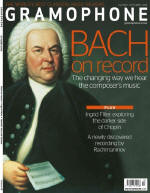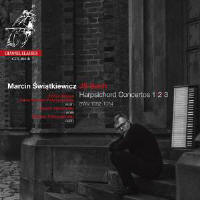Texte paru dans: / Appeared in: |
|
|
Outil de traduction (Très approximatif) |
|
|
Reviewer: Charlotte Gardner Rarely have I clapped ears on a new Bach harpsichord concertos offering and heard such a distinctively characterful and exuberantly flowing sound right from the opening bars. However, when you consider that Marcin Światkiewicz was the harpsichordist who in 2015 shone an attractively characterful and joyous light on the little-known keyboard concertos of Johann Gottfried Müthel (BIS, 6/15), then it all clicks into place. Everything here has been meticulously and knowledgeably thought through, beginning with Światkiewicz’s having used a different, brilliantly judged keyboard for each work: for the D minor Concerto a darkly resonant German instrument with a 16-foot register; for the E major a more delicate French model; and a jewel-toned Flemish model for the D major. Światkiewicz’s forces are based on the string-quartet-without-double-bass model Bach used at his Friday-night Café Zimmerman concerts in Leipzig. First impressions aren’t of a lean chamber sound at all: its crispness comes so very glowingly warm and full-textured. Yet you can also hear every musician – good news when the ensemble is topped by Il Pomo d’Oro concertmaster Zefira Valova and underpinned by Tomasz Pokrzywinski, Arte dei Suonatori and Holland Baroque’s principal cellist – and there’s no question that the sound’s strikingly light-footed, flowing and liberated quality is the reward of gifting such a crack team of period specialists complete autonomy over their individual parts. Światkiewicz himself leads this gloriously unleashed character: nimble and brilliant, and with a subtle push and pull which drives rather than slows the overall momentum. He’s fearless with his touch, too, putting his full weight behind his fortes to maximise dynamic contrasts. As for embellishments, the musicians are following instincts rather than a literal reading of the score. The strings in the D major Concerto’s final Allegro are a wonderful example of the life and personality this enables. Listen to their joyous little tucked embellishments and savour especially Valova’s cheeky folky upwards inflections at 2'12". And all this without anybody ever sounding like they’re taking scholarly liberties. Au contraire, this simply feels like music-making fully in the spirit of those Leipzig Friday nights. |
|




